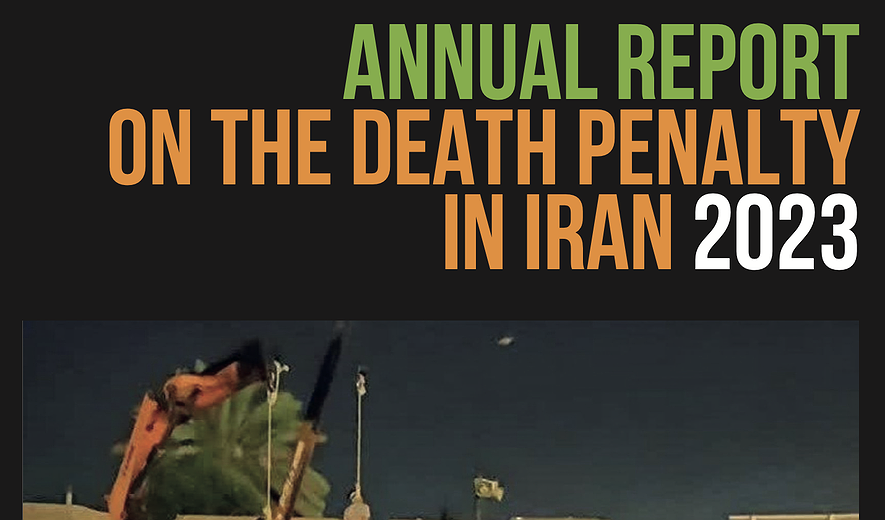Executions Related to Protests in 2023
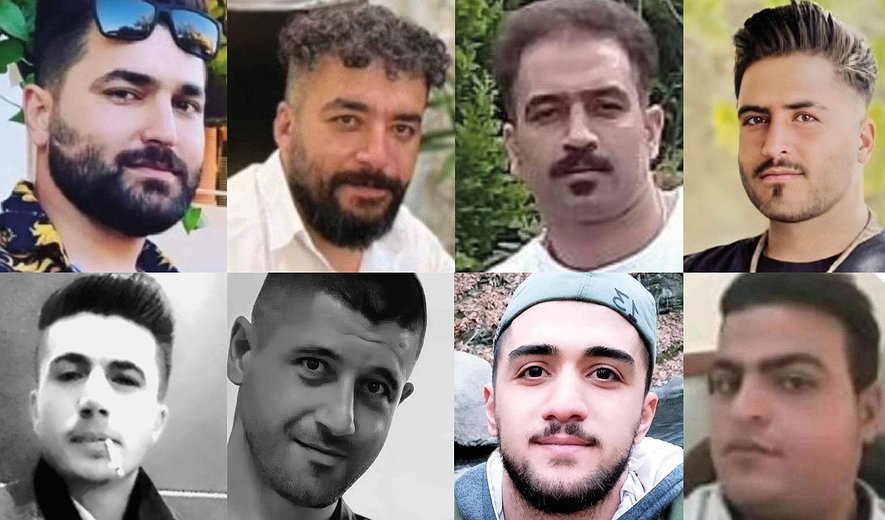
This is an extract from the 2023 Annual Report on the Death Penalty in Iran. To read the full report, please click here.
While the Islamic Republic has a bloody history of executing protesters, the execution of protesters in recent years began in 2020 after a series of nationwide protests in 2016-2019. Protesters Mostafa Salehi and Navid Afkari were both sentenced to death for fabricated charges of moharebeh and murder but were executed for the latter to remove responsibility from the authorities.[1]Following mass public backlash and international pressure, other known protesters on death row were released. At least two November 2019 protesters remain at risk and one was executed in 2023.
The execution of “Woman, Life, Freedom” protesters began in December 2022 with Mohsen Shekari and Majidreza Rahnavard’s hasty executions and continue to this day. In 2023, eight more protesters were executed for security-related and murder charges. Information and news on protester death penalty cases have been opaque and intentionally marred with disinformation to cause confusion and conflict from the outset. Families have also been threatened to stay quiet with false promises of lesser sentences and release in exchange. In cases of available information, all protesters facing death penalty charges, sentences or execution have been tortured to force self-incriminating confessions which have been used as evidence of their charges. In some cases, defendants have been forced to stage the state accounts of events on camera which are also used as evidence. Furthermore, per the Note to Article 48 of the CCP, protesters were not only denied access to their lawyers in the initial interrogation phase, but were also systematically denied access in the trial and appeal stages of their legal proceedings. The court-appointed lawyers, whose fees are also often beyond the families’ means, do not provide adequate legal representation and protesters are denied all due process and fair trial rights at show trials that lack any legitimacy.
The charges brought against protesters have been security-related or murder, or in some cases, double jeopardy. While security-related charges of moharebeh and efsad-fil-arz have led to the most number of executions amongst protesters since 2020, all but one case (Mohsen Shekari) was linked to the death of armed forces, with their families used in propaganda to incite support for the execution of the supposed perpetrators. As international and domestic pressure mounts, authorities will likely use qisas charges more to evade accountability and shift responsibility to the victims’ families.
The majority of protester death penalty cases in 2023 were reported by families and human rights defenders at their own risk.[2] It is important to acknowledge the expansive campaign by Iranians and the international community to stop protester executions; in its absence, the number of executions would have been much higher.
A resolution adopted by the EU Parliament on 19 January 2023, condemned “ in the strongest terms the death sentences against and executions of peaceful protesters in Iran” and demanded an immediate and unconditional halt to “any plans to carry out executions and refrain from seeking further death sentences.”[3]
In his report to the 52nd Human Rights Council session in February 2023, Javaid Rehman, Special Rapporteur on the Situation of Human Rights in the Islamic Republic of Iran, expressed his alarm “at the execution of two protesters and the reported sentencing to death of several others after sham trials, violating the right to a fair trial and denying the right to due process.” He reiterates that“all death sentences and consequent executions constitute arbitrary deprivation of life.”[4]
Protesters executed in 2023:
Mohammad Mehdi Karami and Seyed Mohammad Hosseini
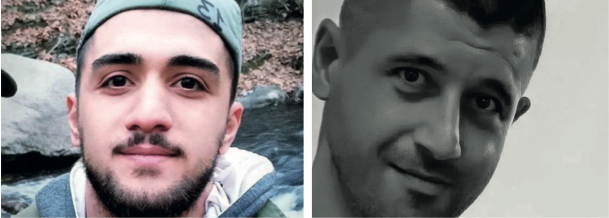
Mohammad Mehdi Karami and Seyed Mohammad Hosseini were arrested after taking part in the 40th day ceremony for slain protester Hadis Najafi in Karaj on 3 November 2022. Their torture-tainted confessions were aired in a program made about the case before the commencement of any legal proceedings. They were also forced to reconstruct the scene as dictated. In a group trial of 16 that included juvenile offenders, the defendants in the case were accused of taking part in an IRGC agent’s death, and tried over two days on 30-31 November 2022. Five men, including Mohmmad Mehdi Karami and Mohammad Hosseini, were sentenced to death for charges of efsad-fil-arz. Their sentence was upheld by the Supreme Court on 3 January 2023 while the other three men were granted appeal. Mohammad Mehdi Karami was on a dry hunger strike for his lawyer to be granted access to his case when he and Seyed Mohammad were executed in Karaj Penitentiary on 7 January 2023.[5] As Mohammad Hosseini had no relatives, he was immediately adopted by Mohammad Mehdi’s father, Mashallah Karami. Mohammad Hosseini’s lawyer, Ali Sharifzadeh Ardakani, was later arrested for revealing details of torture his client had been subjected to.[6] Mashallah Karami has been jailed since 22 August 2023 for seeking justice for his two sons,[7] and his lawyer was detained for over three months for representing the family.[8]
Saleh Mirhashemi, Saeed Yaghoubi and Majid Kazemi
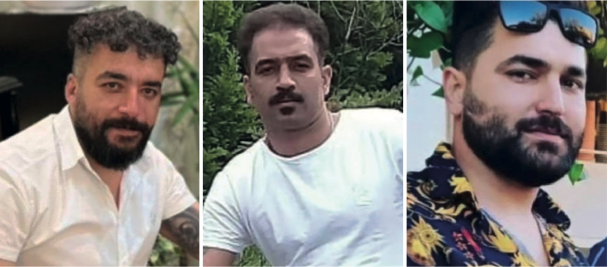
Saleh Mirhashemi, Majid Kazemi and Saeed Yaghoubi were Isfahan protesters arrested in relation to the death of three repressive forces in Isfahan on 16 November 2022 in what became known as the “khaneye Isfahan” case. Ten people including Majid and Saleh’s brothers, were tortured to force televised self-incriminating confessions, to testify against each other and to take part in a reconstruction of the alleged crime scene, during which they were forced to repeat the scenario as was dictated to them. Their torture-tainted forced confessions were aired prior to legal proceedings. Of the ten defendants, Saleh, Majid and Saeed were handed death penalties for charges of moharebeh on 9 January 2023, which were upheld by the Supreme Court on 9 May 2023.[9] On 17 May 2023, their families called for people to gather outside the prison in an attempt to save their lives.[10] Despite all efforts, Saleh, Majid and Saeed were executed in Isfahan Central Prison on 19 May 2023.[11]
Milad Zohrevand
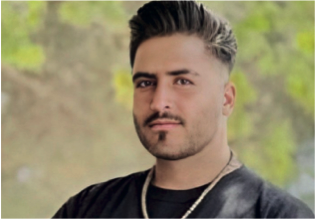
Milad Zohrevand was a 21-year-old Malayer protester arrested on 27 October 2022, on the 40th day anniversary of Jina (Mahsa) Amini’s death. State media alleged that Milad Zohrevand had killed an IRGC officer that day, for which he was sentenced to qisas. Very little information was available about his case. On 15 November 2023, Milad’s sentence was upheld by the Supreme Court and he was secretly executed in Hamedan Central Prison on 22 November 2023.[12] He was buried in the Christian cemetery amid heavy security two days later where his mother Afsaneh was arrested for “wailing” while burying her son.[13]
Hani Albu-Shahbazi
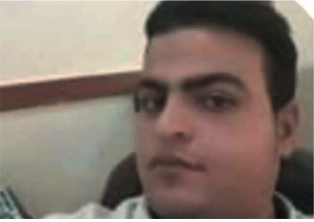
Hani Albu-Shahbazi was a 32-year-old Arab protester who was originally reported to have been shot dead during the 2019 nationwide protests in Shadegan. Arrested on 3 December 2019, he was subjected to torture to make false confessions to killing two repressive forces. Hani was sentenced to death for charges of moharebeh through the two murders by the Abadan Revolutionary Court. According to state media, his execution was carried out in Ahvaz Sepidar Prison after his sentence was upheld by the Supreme Court. While the exact date of his execution was not specified, it was reported on 28 November 2023.[14]
Kamran Rezaei
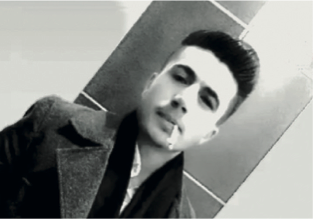
Kamran Rezaei was arrested during the November 2019 nationwide protests. He was held in solitary confinement for seven months and forced to make self-incriminating confessions under torture so severe that he had blood in his urine for a long time afterwards and also sustained damage to his right ear. Informed sources told IHRNGO that “he always said he was innocent and would be released.” Kamran had lost his father at the age of 8 and lived with his step-mother and “didn’t have any family or anyone that cared to do anything for him or publicise his case,” per IHRNGO sources. He was sentenced to qisas for the murder of an IRGC officer and executed in Shiraz Central Prison on 30 November 2023.[15]
[1] 2020 Annual Report on the Death Penalty in Iran, page 41: https://iranhr.net/media/files/Rapport_iran_2021-gb-290321-BD.pdf
[2] https://iranhr.net/en/articles/5669/
[3] https://www.europarl.europa.eu/doceo/document/TA-9-2023-0016_EN.html
[4] https://www.ohchr.org/en/documents/country-reports/ahrc5267-situation-human-rights-islamic-republic-iran-report-special
[5] https://iranhr.net/en/articles/5685/
[6] Iran Human Rights 2023 Human Rights Defenders Report, page 25: https://iranhr.net/media/files/HRD_2023_Eng_Final.pdf
[7] Iran Human Rights 2023 Human Rights Defenders Report, page 45: https://iranhr.net/media/files/HRD_2023_Eng_Final.pdf
[8] Iran Human Rights 2023 Human Rights Defenders Report, page 18: https://iranhr.net/media/files/HRD_2023_Eng_Final.pdf
[9] https://iranhr.net/en/articles/5901/
[10] https://iranhr.net/en/articles/5917/
[11] https://iranhr.net/en/articles/5925/
[12] https://iranhr.net/en/articles/6339/
[13] https://iranhr.net/en/articles/6354/
